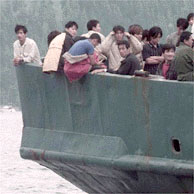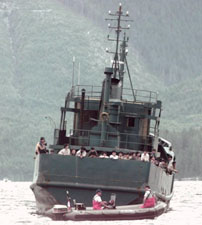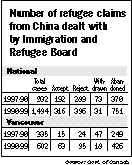 Saturday, January 08, 2000 | National Post Mark Stevenson
Saturday, January 08, 2000 | National Post Mark Stevenson
China has millions of “internal migrants” and all of them are potential candidates for illegal migration to Canada, an expert says.
An estimated 80 million Chinese are currently floating around the country in a quasi-legal state without a permanent place to live, and many might leave their country for a boat trip to Canada, one of the “weakest links” in the world for illegal refugees, according to Don DeVoretz, a director at the centre for Research on Immigration and Integration in the Metropolis at Simon Fraser University.


“Unless China addresses this internal problem, we’re going to see more and more people … [coming to Canada],” said Prof. DeVoretz, who is a professor of economics.
“No amount of border control here or cajoling China is going to reduce the pressure,” he said.
Millions of Chinese are caught in the middle of the country’s transition from an agrarian society to an urban, industrial one, with rural residents being forced off the land by farm consolidation and low produce prices and into cities where they have no legal r ight to permanently live, Prof. DeVoretz said.
ight to permanently live, Prof. DeVoretz said.
The migrants find employment in Chinese cities, but their insecure status means many are able and willing to pay low-level officials to look the other way so they can leave the country, he said.
“They’re considered temporary movers and they’re not allowed to stay [in the cities] permanently,” Prof. DeVoretz said.
“So they’re always on the move or about to get booted. These are the people who are doing construction and illicit activities, who are prime candidates for moving because they’re making money and they can pay a down payment to leave.”
The RCMP said Thursday it found 10 female teenagers from China in the back of a van on its way to the U.S. border near Sarnia, Ont. The girls, aged 14 to 18, are in custody and two Ontario residents face smuggling charges. In a second incident, six Chinese teenagers, aged 14 to 17, and their accomplices were captured during an attempt to enter the U.S. by rafting across the Niagara River.
The arrests come only days after 25 Chinese nationals were found in a cargo container aboard a ship in Vancouver. The stowaways have claimed refugee status in Canada, officials said yesterday.
Immigration officials will hold the stowaways in custody. “We are not satisfied with their identity [claims] at this time,” Janis Harper, an Immigration spokeswoman, said.
Unlike the 600 refugees who came ashore last summer from Fujian province, Prof. DeVoretz says the next waves of migrants will likely come from all over China.
He said only a fraction of the migrants might end up leaving China, but a fraction could translate into thousands of illegal refugees.
“If next summer and spring we have more boatloads showing up here and all the processing power of [Canadian Immigration] went into enforcement, legitimate immigrants won’t get into this country,” he said. “There is going to be a real legal enforcement problem.”
Prof. DeVoretz said many migrants choose Canada because they can launch refugee appeals under the Charter of Rights. Canada should confiscate ships and deport illegal refugees quickly to remove the economic incentive for their smugglers and beef up coastal surveillance, he said.
